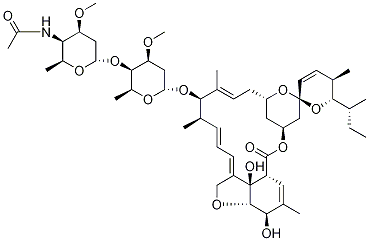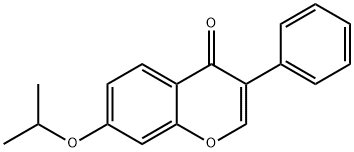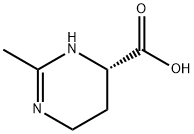Eprinomectin , Analysis standard , 123997-26-2
Synonym(s):
(4′’R)-4″-(Acetylamino)-4″-deoxy-avermectin B1 solution;(4′’R)-4″-(Acetylamino)-4″-deoxy-avermectin B1;Eprinomectin;Mixture of component B1a and component B1b
CAS NO.:123997-26-2
Empirical Formula: C50H75NO14
Molecular Weight: 914.129
MDL number: MFCD07370747
EINECS: 602-966-4
| Pack Size | Price | Stock | Quantity |
| 100MG | RMB927.20 | In Stock |
|
| others | Enquire |
PRODUCT Properties
| Melting point: | 163-166°C |
| Density | 1.23 |
| Flash point: | 2 °C |
| storage temp. | 2-8°C |
| solubility | DMF: 30 mg/ml; DMSO: 30 mg/ml; Ethanol: 30 mg/ml |
| form | Solid |
| color | White to off-white |
| Stability: | Hygroscopic |
Description and Uses
Eprinomectin is a semisynthetic avermectin that consists of a mixture of two homologues, eprinomectin B1a (4 epi-acetylamino-4 -deoxy-avermectin B1; 90%) and eprinomectin B1b (10%).Eprinomectin was developed as a topical endectocide for all categories of cattle including lactating dairy cattle, and the process by which eprinomectin was selected for further development has been described (90). Briefly, several hundred avermectin/ milbemycin analogues were screened in a sheep model for efficacy against a range of endoparasites and in lactating dairy cows for a low milk:plasma partitioning ratio. Themilk:plasma ratio for eprinomectin is <0.2; ivermectin, by comparison, partitions equally between milk and plasma.
Eprinomectin is a mixture of eprinomectins B1a and B1b in a 9:1 ratio, produced from a mixture of avermectin B1a and B1b. Eprinomectin is used commercially as a topical endectocide (insecticide, miticide and nematocide) for cattle, including lactating dairy cows. Like all avermectins and milbemycins, eprinomectin acts by binding to parasite glutamate-gated chloride ion channels and disrupts neurotransmission leading to paralysis and death of the parasite, mite or insect.
Safety
| Symbol(GHS) |    GHS06,GHS08,GHS09 |
| Signal word | Danger |
| Hazard statements | H301-H361-H410 |
| Precautionary statements | P201-P273-P301+P310+P330 |
| Hazard Codes | F,Xn,N,T |
| Risk Statements | 11-20/21/22-36-62-50/53-25-63 |
| Safety Statements | 26-36/37-16-61-60-45 |
| RIDADR | UN 2811 |
| WGK Germany | 3 |
| HS Code | 2941906000 |
| Toxicity | LD50 orally in mice: 24 mg/kg (Jones) |



